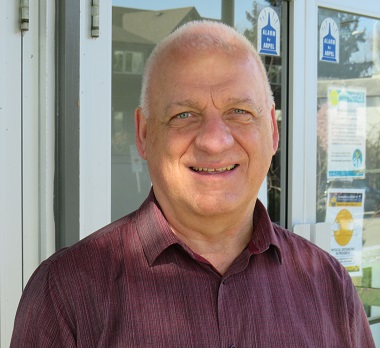 “What goes on in North America is just a tiny fraction of what goes on in the refugee world.” James Grunau knows what he is talking about.
“What goes on in North America is just a tiny fraction of what goes on in the refugee world.” James Grunau knows what he is talking about.
He has spent many years welcoming refugee claimants to Metro Vancouver, while also taking an active role in groups such as the Refugee Highway Partnership.
And this year he will transition from the local scene to the international. Grunau is stepping down as executive director of Journey Home Community at the end of June.
Following several months of sabbatical and rest he will begin focusing more seriously on the big picture.
Unexpected journey
“I’ve been going at it pretty hard for 15 years,” he told me as we chatted outside the Journey Home headquarters at the Royal Oak Ministry Centre in Burnaby. People were coming and going, participating in a food hub Journey Home co-sponsors with Pacific Immigrant Resources Society.
Grunau told me how Journey Home began. Originally from Alberta, he had always been interested in international missions. But instead ended up as general manager of a home renovation company here in BC.
Over time, he said, “Things got sorted out internally, and I was able to go where my heart was taking me.” In 2004, he knew it was time to make a change. He visited South Sudan and investigated refugee work in Toronto.
A real turning point came when he took a course on internationalism and Christian global development at Regent College: “That was the course for me.” His assigned case study “woke me up to this huge unmet need in Vancouver.”
He shared this new enthusiasm with his home group at Willingdon Church, which was very receptive. Most were already internationally-minded, and after some prayer and preparation they made a ministry proposal to the church. One couple offered the use of their rental home.
“Let’s get going!” was the general response. By the fall of 2005 they had two refugee families living in the house. “It was a pretty heady time,” said Grunau. “You’re involved in something that is really on the ground. And we were still doing our day jobs.”

Journey Home works closely with churches in welcoming refugee claimants.
By December they had begun a non-profit society. What really launched the work, he said, was funding from World Vision. After some hesitation, Willingdon “came on 110 percent,” offering funding, personnel, ‘Communities of Welcome’ teams and volunteers.
“It took some time, but as they saw the impact . . . Willingdon has been a major resource supporter.” The women’s sewing group, for example, has given a hand-made quilt to every one of the refugee claimants who have come through the ministry houses.
Grunau’s home group remains supportive and a couple of members (John Dyck and Jeff Svanhill) are currently serving on the board.
How Journey Home works
Grunau said Journey Home works with refugee claimants (asylum seekers) rather than with government or privately sponsored refugees whose claims have already been approved before they arrive in Canada.
One way Journey Home supports refugee claimants is through their two Welcome Houses in New Westminster, three transition apartments (in partnership with BC Housing) in Burnaby and a transitional condominium in Surrey:
Through our Welcome Houses, families have a place ‘to land’ which is furnished and ready. Journey Home staff and select volunteers assist families as they begin to settle into Canada. During their three to four month stay, we work with them in locating more permanent housing. Through living together with core hosts and other new arrivals, attending community meals and as we support them in their journey, we become like family. The relationships formed sometimes last for years.
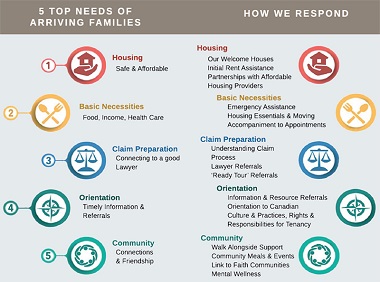 Journey Home has also been developing Communities of Welcome, now supported by 15 churches:
Journey Home has also been developing Communities of Welcome, now supported by 15 churches:
Communities of Welcome for Refugee Claimants was launched three years ago as a pilot program to increase the number of refugee claimant families we can support.
Through this initiative we train and equip community groups who then assist refugee claimant families for 12 to 18 months. They help families secure transitional, then permanent housing while receiving settlement support. By connecting with refugee claimant families shortly after their arrival, families are kept from experiencing homelessness while they are diverted away from a shelter system not equipped to meet their needs.
Grunau said that while there are many organizations working with refugees, “very few others are doing the housing piece.” And several of those few others providing housing are Christian groups – Kinbrace (Vancouver), New Hope (Surrey) and Inasmuch (Abbotsford).
At Journey Home’s April 23 AGM, it was announced that the ministry has weathered Covid well, keeping on all nine staff and even growing a bit.
The pandemic has been particularly challenging for refugees, but the the Welcome Houses and Communities of Welcome have hosted as many claimants (more than 90) as in the previous highest year, by shifting gears slightly to house people who were already here in BC and then made a claim, as well as some who were under-housed and some new arrivals.
One Community of Welcome partnership involves Tenth Church, which is now connecting with about 130 refugee claimants and has just hired Tess Fuller as a refugee settlement worker.
International focus
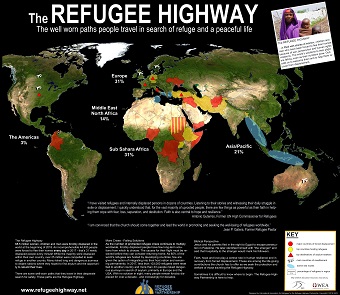
Click on link for a full view of the map.
As he switches his main focus from the local to the international scene, Grunau says he wants to take a few months to rest and “make good sound decisions in a place of rest, not fatigue.” With the pandemic receding, he hopes to undertake some exploratory travel.
He points out that nations such as Jordan, Lebanon, Turkey, Colombia and Uganda are bearing the brunt of the problem, hosting millions of refugees:
My heartbeat around this is that the high, high percentage of refugees are hosted by developing countries – there is a huge imbalance. How can we open up North America to seeing to global needs, beyond what is going on in North America?
I’d love to see refugee short-term teams go out – like missions short-term teams, and exchange trips so that some can come here.
He endorses the three durable solutions proposed by the UNHCR (UN High Commissioner for Refugees):
-
- Voluntary repatriation: help return to country of origin
- Resettlement: help create opportunities in resettlement countries
- Local integration: help refugees in settle in host country
The UNHCR’s Solutions for Refugees publication states:
There is no hierarchy of durable solutions; rather, an integrated approach that combines all three solutions and is implemented in close cooperation with countries of origin, host States, humanitarian and development actors, as well as the refugees themselves usually offers the best chances for success.
Enabling refugees to become self-reliant pending the realization of an appropriate long-term solution is an important first step towards achieving any of the three durable solutions. Working towards solutions can also reduce the need for irregular onward movements by refugees.
Grunau supports all three solutions, including welcoming refugees in Canada, but says he would like more North Americans to focus on refugees where they already are: “There is a whole generation of refugee children not being educated.”
As he looks forward to a more active international role, he already has some strong connections. He is part of the global leadership team (representing North America) for the Refugee Highway Partnership, a network sponsored by the World Evangelical Alliance.
Lasting impact
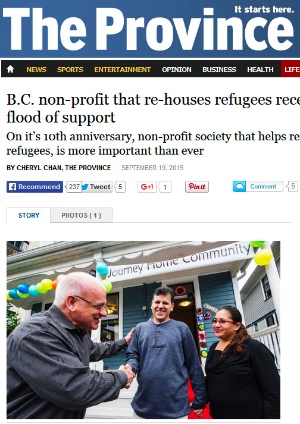 Loren Balisky, co-founder of Kinbrace Refugee Housing & Support, wrote me about Grunau’s contribution in Metro Vancouver:
Loren Balisky, co-founder of Kinbrace Refugee Housing & Support, wrote me about Grunau’s contribution in Metro Vancouver:
James’ impact on the wellbeing of refugee claimants arriving in BC since 2005 is significant. He seeded and helped grow what is now BC’s leading housing provider for refugee claimants.
As a colleague in the refugee claimant serving sector, I have admired and been shaped by James’ influence and leadership and his entrepreneurial approach to leading Journey Home.
James integrated his professional work with his life, working with the landlord of his apartment building to provide affordable permanent homes for refugee claimants as vacancies came open.
He modeled a personal warm welcome, expressing with vibrant colours of what it means to be a good neighbour to those impacted by the refugee experience.
The sector is saying farewell to a statesman who spent the last 16 years with his sleeves rolled up, his top shirt button undone, his hands, head and heart fully engaged, a ready and hearty laugh, a pen in hand with a list of notes on paper, in his persistent pursuit for the wellbeing of refugee claimants.
Local support
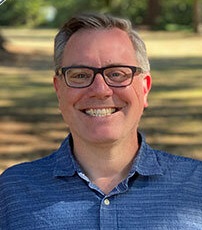
Brad Kinnie
Fortunately, Grunau will not be turning his back on the local scene. He is very supportive of Brad Kinnie, who has been with Journey Home for almost 12 years and will now take on the role of executive director June 1: “He carries the heartbeat of the work, and brings all of that background into the leadership role.”
Along with strengthening the Welcome Houses and Communities of Welcome, Journey Home has been working with a number of other agencies to create a safe landing place for those not sponsored by government or private groups.
“What if there were a bed and space available for every new arrival,” said Grunau, adding that people who end up at Journey Home Welcome Houses typically have been in several short-term, usually unsuitable places first.
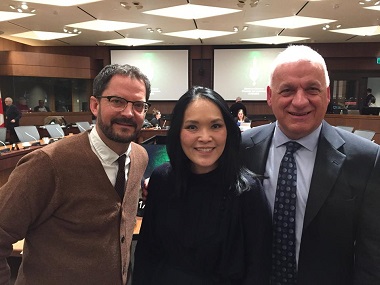
James Grunau (right) and Loren Balisky with NDP MP for Vancouver East Jenny Kwan, who was co-vice-chair of the Standing Committee on Citizenship and Immigration.
Balisky said:
As co-chair with James of the BC Multi-Agency Partnership (MAP) Housing Working Group for refugee claimants, I learned from James’ wise capacity to listen, advocate and act for the mostly invisible yet significant population of people seeking refugee protection in our province and country.
His influence reached Ottawa when he took his vision for a made-in-BC Refugee Claimant Reception Centre to the Parliament’s Standing Committee on Citizenship and Immigration.
I posted a story about that initiative two years ago, including Grunau’s comment before the standing committee.
Grunau told me there is now a consultant interviewing 30 – 40 agencies about the Refugee Claimant Reception Centre project. Grunau himself will continue to support Kinnie as that process continues: “That would be one of my dreams come true.”

We have all been touched in many ways by James’ compassion and belief that with a seed of an idea it can blossom and flourish. His leadership and collaboration within the refugee claimant community has helped so many and has really driven the spirit in tangible ways on how to build more welcoming and inclusive communities. Very best wishes as you venture forth on your next chapter of life.
James has done all this and more. He has been a strong force in hosting and promoting the Ride for Refuge each fall which has helped hundreds of charities with funding. As the founder of New Hope Community Services Society I have seen James grow in his global passion for refugees. Our prayers go with James.